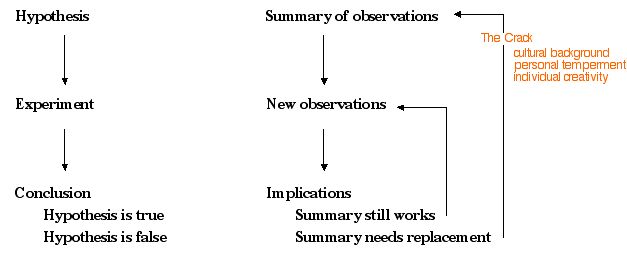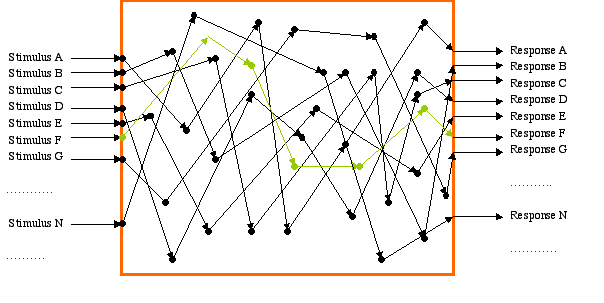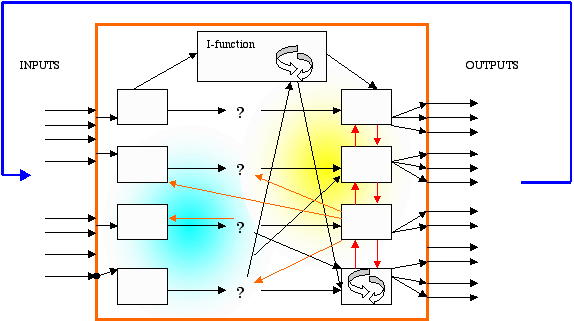
Life is not really so difficult if you just follow the instructions
|
"Born in 1994 ... conceived as a interacting and developing system, not unlike a living organism ..."
"Serendip is ... a gathering place for people who suspect that life's instructions are always ambiguous and incomplete ... an expanding forum and continually developing set of resources to explore and support intellectual and social change in education, in social organization ... and in how one makes sense of life"
What has Serendip learned, about itself? about the world around it? Or, more accurately, what have I, as one of its parents, learned from watching it grow/evolve?
|
The Potential ("people can develop their ideas and perspectives in extensive interaction with other people")
and the Naive Ideal
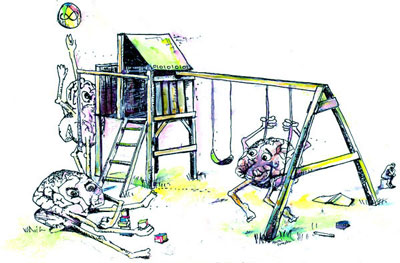
| 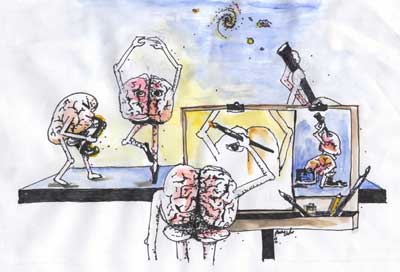
|
| Build it (a rich interactive playground) and they will come.
|
- Non-profit
- Asynchronous (stop by any time)
- Community not as origin, possibly as consequence?
|
Some Do ... But Lots Don't (Yet?) ... Why?
Contributors: - From 3 -> 40+ (mostly local, mostly one time)
- Many more students (required in courses)
- Enthusiasm for participation in a "world-wide cultural and intellectual interchange"?
Visitors:
- > 1 million unique visitors a year (~10,000 a day), >95% from outside Bryn Mawr, ~40% from outside US (not bad reach)
- 4.3 pages per visit, 1.4 visits per visitor (lots not coming back)
- 60% from Google/Yahoo/Ask Jeeves/etc
- Not BAD, some partial exchanging (most visits relate to student papers) ... BUT much of it is info-collecting rather than interchange ...
Barriers to "interchange" ... on Serendip? on web? in general?
(Some lessons from recent Serendip exhibits and forums)
- People need to be invited individually and specifically?
- There needs to be a task more sharply defined than "exchange"?
- People need to be assured they are being listened to, ie that others are changing as a result of what they say?
- People need to be willing/able to be vulnerable, ie to be changed by what other people say?
- People need to overcome a concern about "privacy"?
- People need to overcome a concern about being an outsider? being either judged badly by insiders or feeling themselves like a disrupter?
- People want to be seen as a distinctive individuals and responded to by particular distinctive other individuals
- People want to feel some shared agreements about how one exchanges ideas, including understandings about language and style
- People want to work with others who are like themselves
- People worry about making "thoughts in progress" "public"
Many of these things occur automatically in existing communities and in face to face interactions occuring synchrononously (on the web or not). And we can try to find ways to do them more effectively on Serendip and on the web generally.
- Target forums to groups, to subjects
- Add audio tracks
- Increase "leader" attention to forums, help people become better "leaders"
- Add "synchronous" capability?
But there is something to be said for the additional distinctive kinds of interaction that the web makes possible ... and for evolving human interactions generally in new ways based on those experiences ...
- Continue to encourage people to think of themselves as including aspects beyond their particular group identities and known interests
- Continue to encourage people to become their own "leaders" and "readers"/"listeners"
- Continue to encourage people to value "thoughts in progress", appreciate "process" as much as "outcome", to both value in process products and trust their own the usefulness to others of their own
- Continue to encourage people to incorporate the kind of self-reflectiveness that is faciliated by intermittent as opposed to synchronous exchange, ie to make use of "disconnection" to allow new thoughts/questions to arise, thoughts/questions that might not in direct contact with others
- Continue to encourage people to value the ongoing process of "thinking for oneself", the value both for oneself and for others
General lessons from the web about the prospects of "a nexus point that encourages and supports ..."
- We tend to be afraid of
- being attacked
- being ignored
- being held accountable for thoughts of our own
- being changed by thoughts of other people
- being judged wrong (by ?)
- We tend to take ourselves both too seriously and not seriously enough
- "Life's instructions are always ambiguous and incomplete ... " because there is no one writing them but ourselves ... and no way to write them but by trying things out and seeing what happens ("getting it less wrong"). We need communities of people who think for themselves, are committed to and enjoy working on continually updating and revising instruction manuals together. The skills of asynchronomous communication are an essential part of creating such communities.
|
